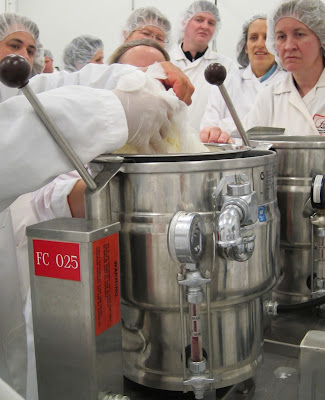Altos de Luzon: Wine from Jumilla, Spain
Mediterranean Sunshine and Grapes
 I am infatuated with Spain and wine. So when Doug Reichel (Doug Reichel Wine Marketing Inc.) suggested that I try Altos de Luzon, a wine from southeast Spain, I leapt at the opportunity. And I’m glad I did as I enjoyed the wine and will buy it again.
I am infatuated with Spain and wine. So when Doug Reichel (Doug Reichel Wine Marketing Inc.) suggested that I try Altos de Luzon, a wine from southeast Spain, I leapt at the opportunity. And I’m glad I did as I enjoyed the wine and will buy it again.Spanish Wine
Spain produces a huge amount of wine, but most of it is sold in Europe. Some regions, such as Rioja, have gained an international reputation, but there are other wine regions which fly under the radar. One of these is Jumilla, in southeast Spain, slightly inland from the Mediterranean.
Altos de Luzon (Jumilla 2005) is one of several wines produced by Bodegas Luzon winery, which was founded in 1916 by a group of winemaking families.
The Luzon vineyards are located in the Jumilla region, south of Valencia and inland from Murcia. It’s a sunny, hot, dry mountain plateau. Grapes have been grown here for over 2,000 years, starting with the Phoenicians, the Romans, and the Moors.
Soil and Climate
Extreme heat does not usually produce great wine, but in Jumilla the heat is tempered by the cool night-time temperatures, which preserve the wine’s acidity, and the local Monastrell grapes do well here. Legend has it that the grapes were first grown in the monasteries of Catalonia, hence the name.
Jumilla has sandy soil containing very little organic material. As a result, it escaped the phylloxera epidemic, which forced most of Europe to replant its vineyards with vines grafted onto American rootstock. So Altos de Luzon benefits from a blend of 50-year old ungrafted Monastrell vines, combined with 25% Tempranillo and 25% Cabernet Sauvignon from 20-year old vines. A healthy blend of old and new.
Robust but Subtle
Now to the important stuff! I really enjoyed the taste of Altos de Luzon and it was a good combination with a rich eggplant moussaka. It has lots of fruity, acidic flavour and compares very favourably with Pinot Noir (one of my personal favourites). I much prefer it to Malbec wines, which are too strong for my taste.
Altos de Luzon 2005 was aged for 12 months in French and American oak (20% new oak). The wine has a smooth, subtle, smoky finish; it’s not agressively oaky. I’ve always wondered why there was such a difference between wine that was aged in French and American oak. Apparently American oak has much bigger pores so the wine absorbs more of the oaky taste.
Mediterranean Diet
The village of Jumilla is located at the foot of a 15th century castle, and there are several bodegas offering wine tastings. The Wine Travel Guide to the World says that a farmhouse on the Luzon estate has been converted to a hotel with its windows overlooking the vineyards, but I was unable to find any additional information.
 There are so many good reasons to visit Spain – the wine, the olives, the architecture, the sun. This description of paella, said to originate in nearby Valencia, evokes so many of the things I love about Spain:
There are so many good reasons to visit Spain – the wine, the olives, the architecture, the sun. This description of paella, said to originate in nearby Valencia, evokes so many of the things I love about Spain: “But paella has come to represent a large part of what I love about Spain and why I have chosen to make my home here. It is a dish that embodies the strange contrast of old and new that forms the powerful identity of this country. Its ingredients have been wholly incorporated into the Spanish cuisine and culture, and yet almost none of them are native to the Iberian Peninsula: rice and saffron were introduced by the Moors between the 8th and 11th centuries; the olive tree and its oil were brought by the Phoenicians roughly two millennia earlier; the indispensible pan that the dish is cooked in comes from the Latin word patella, brought by the Romans; even the Spanish wine (whichever of many you choose) that should always accompany your favourite paella has its origins elsewhere.”
The Luzon wines are brought to Saskatchewan by Doug Reichel Wine Marketing. Altos de Luzon costs approximately $28 in Saskatchewan and is available in the government liquor stores. The Dulce de Luzon dessert wine and the two organic Luzon wines are also excellent.
Further Information:
Catavino is an informative website/blog about Iberian wines
Vinos de Jumilla
Jumilla Spain and Monastrell Grape
The Mystery and Magic of Murcia
Doug Reichel Wine Seminars




Comments
Looking forward to sharing more travel stories with you!
Doreen Pendgracs